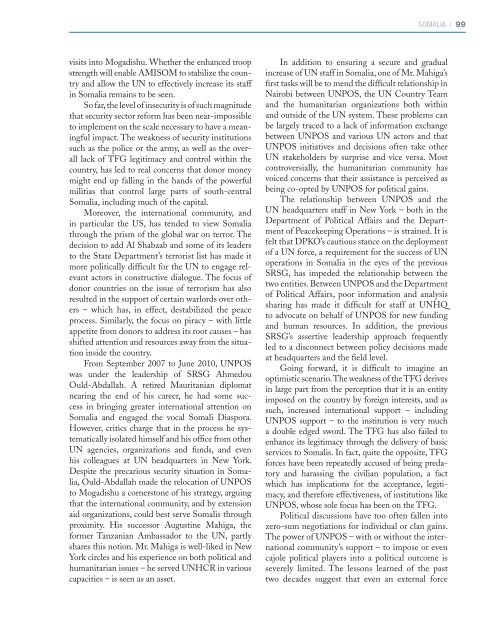here - Center on International Cooperation - New York University
here - Center on International Cooperation - New York University
here - Center on International Cooperation - New York University
Create successful ePaper yourself
Turn your PDF publications into a flip-book with our unique Google optimized e-Paper software.
Somalia | 99visits into Mogadishu. Whether the enhanced troopstrength will enable AMISOM to stabilize the countryand allow the UN to effectively increase its staffin Somalia remains to be seen.So far, the level of insecurity is of such magnitudethat security sector reform has been near-impossibleto implement <strong>on</strong> the scale necessary to have a meaningfulimpact. The weakness of security instituti<strong>on</strong>ssuch as the police or the army, as well as the overalllack of TFG legitimacy and c<strong>on</strong>trol within thecountry, has led to real c<strong>on</strong>cerns that d<strong>on</strong>or m<strong>on</strong>eymight end up falling in the hands of the powerfulmilitias that c<strong>on</strong>trol large parts of south-centralSomalia, including much of the capital.Moreover, the internati<strong>on</strong>al community, andin particular the US, has tended to view Somaliathrough the prism of the global war <strong>on</strong> terror. Thedecisi<strong>on</strong> to add Al Shabaab and some of its leadersto the State Department’s terrorist list has made itmore politically difficult for the UN to engage relevantactors in c<strong>on</strong>structive dialogue. The focus ofd<strong>on</strong>or countries <strong>on</strong> the issue of terrorism has alsoresulted in the support of certain warlords over others– which has, in effect, destabilized the peaceprocess. Similarly, the focus <strong>on</strong> piracy – with littleappetite from d<strong>on</strong>ors to address its root causes – hasshifted attenti<strong>on</strong> and resources away from the situati<strong>on</strong>inside the country.From September 2007 to June 2010, UNPOSwas under the leadership of SRSG AhmedouOuld-Abdallah. A retired Mauritanian diplomatnearing the end of his career, he had some successin bringing greater internati<strong>on</strong>al attenti<strong>on</strong> <strong>on</strong>Somalia and engaged the vocal Somali Diaspora.However, critics charge that in the process he systematicallyisolated himself and his office from otherUN agencies, organizati<strong>on</strong>s and funds, and evenhis colleagues at UN headquarters in <strong>New</strong> <strong>York</strong>.Despite the precarious security situati<strong>on</strong> in Somalia,Ould-Abdallah made the relocati<strong>on</strong> of UNPOSto Mogadishu a cornerst<strong>on</strong>e of his strategy, arguingthat the internati<strong>on</strong>al community, and by extensi<strong>on</strong>aid organizati<strong>on</strong>s, could best serve Somalis throughproximity. His successor Augustine Mahiga, theformer Tanzanian Ambassador to the UN, partlyshares this noti<strong>on</strong>. Mr. Mahiga is well-liked in <strong>New</strong><strong>York</strong> circles and his experience <strong>on</strong> both political andhumanitarian issues – he served UNHCR in variouscapacities – is seen as an asset.In additi<strong>on</strong> to ensuring a secure and gradualincrease of UN staff in Somalia, <strong>on</strong>e of Mr. Mahiga’sfirst tasks will be to mend the difficult relati<strong>on</strong>ship inNairobi between UNPOS, the UN Country Teamand the humanitarian organizati<strong>on</strong>s both withinand outside of the UN system. These problems canbe largely traced to a lack of informati<strong>on</strong> exchangebetween UNPOS and various UN actors and thatUNPOS initiatives and decisi<strong>on</strong>s often take otherUN stakeholders by surprise and vice versa. Mostc<strong>on</strong>troversially, the humanitarian community hasvoiced c<strong>on</strong>cerns that their assistance is perceived asbeing co-opted by UNPOS for political gains.The relati<strong>on</strong>ship between UNPOS and theUN headquarters staff in <strong>New</strong> <strong>York</strong> – both in theDepartment of Political Affairs and the Departmentof Peacekeeping Operati<strong>on</strong>s – is strained. It isfelt that DPKO’s cautious stance <strong>on</strong> the deploymentof a UN force, a requirement for the success of UNoperati<strong>on</strong>s in Somalia in the eyes of the previousSRSG, has impeded the relati<strong>on</strong>ship between thetwo entities. Between UNPOS and the Departmentof Political Affairs, poor informati<strong>on</strong> and analysissharing has made it difficult for staff at UNHQto advocate <strong>on</strong> behalf of UNPOS for new fundingand human resources. In additi<strong>on</strong>, the previousSRSG’s assertive leadership approach frequentlyled to a disc<strong>on</strong>nect between policy decisi<strong>on</strong>s madeat headquarters and the field level.Going forward, it is difficult to imagine anoptimistic scenario. The weakness of the TFG derivesin large part from the percepti<strong>on</strong> that it is an entityimposed <strong>on</strong> the country by foreign interests, and assuch, increased internati<strong>on</strong>al support – includingUNPOS support – to the instituti<strong>on</strong> is very mucha double edged sword. The TFG has also failed toenhance its legitimacy through the delivery of basicservices to Somalis. In fact, quite the opposite, TFGforces have been repeatedly accused of being predatoryand harassing the civilian populati<strong>on</strong>, a factwhich has implicati<strong>on</strong>s for the acceptance, legitimacy,and t<str<strong>on</strong>g>here</str<strong>on</strong>g>fore effectiveness, of instituti<strong>on</strong>s likeUNPOS, whose sole focus has been <strong>on</strong> the TFG.Political discussi<strong>on</strong>s have too often fallen intozero-sum negotiati<strong>on</strong>s for individual or clan gains.The power of UNPOS – with or without the internati<strong>on</strong>alcommunity’s support – to impose or evencajole political players into a political outcome isseverely limited. The less<strong>on</strong>s learned of the pasttwo decades suggest that even an external force
















